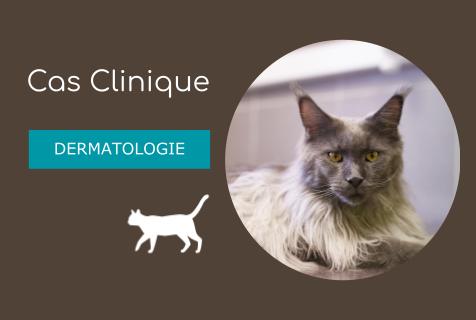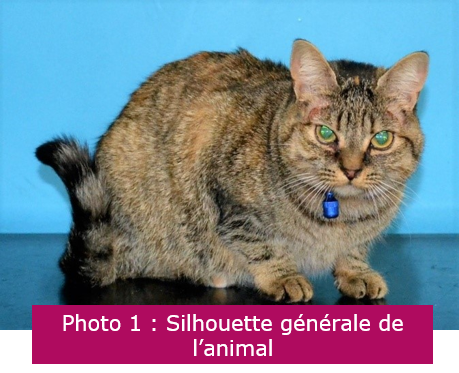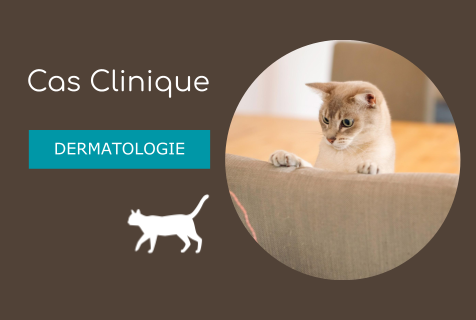Gestion d'un prurit cervico-facial chez un chat [Cas clinique]
Auteurs : T. Brément* ; P. Bourdeau** ; V. Bruet***

Description du cas clinique

La chatte a accès à l’extérieur et aucun autre animal n’est présent au domicile des propriétaires. Elle est régulièrement traitée contre les parasites externes avec un spot-on à base de fipronil tous les mois et contre les parasites internes avec une spécialité à base de milbémycine-oxyme et praziquantel tous les trois mois.
Mise en garde, ce contenu est destiné aux ayants droit du médicament vétérinaire. Se connecter pour accéder au contenu.
Discussion
Mise en garde, ce contenu est destiné aux ayants droit du médicament vétérinaire. Se connecter pour accéder au contenu.
Références
- Bonneau et al., Therapeutic efficacy of topical hydrocortisone aceponate in experimental flea-allergy dermatitis in dogs Australian Veterinary Journal, Volume 87, No 7, July 2009
- Bourdeau et al., Characteristics of pruritus in flea related dermatoses in cats, Poster for the 48th SEVC congress, 2013, Barcelona
- Brazziani et Pimpinelli, New and Established Topical Corticosteroids in Dermatology Clinical Pharmacology and Therapeutic Use, Am J Clin Dermatol 2002; 3 (1): 47-58
- Buckley and Nuttall, Feline Eosinophilic Granuloma Complix(ities) : Some clinical clarification, Journal of Feline Medicine and Surgery 2012 14: 471
- Guaguère E and Prelaud P. Efficacy of cyclosporin in the treatment of 12 cases of eosinophilic granuloma complex. Vet Dermatol 2000; 11: S31.
- Hobi et al., Clinical characteristics and causes of pruritus in cats: a multicentre study on feline hypersensitivity associated dermatoses, Veterinary Dermatology, 2011, 22, 406–413
- Lowe et al., Glucocorticoids in the cat, Veterinary Dermatology, 2008, 19, 6, 340-347
- Navarro et al., Quantity of radiolabelled hydrocortisone aceponate remaining on skin after Cortavance® application in dogs, Poster for the 27th ECVD-ESVD European Congress, Salsburg, Austria, 2014
- Noli C and Scarampella F. Prospective open pilot study on the use of ciclosporin for feline allergic skin disease. J Small Anim Pract 2006; 47: 434–438.
- Nuttall et al., Efficacy of a 0.0584% hydrocortisone aceponate spray in the management of canine atopic dermatitis : a randomised, double blind, placebo-controlled trial, Veterinary Dermatology, 2009, 20, 3, 191-198.
- Ravens et al., Feline atopic dermatitis: a retrospective study of 45 cases (2001–2012), Vet Dermatol 2014; 25: 95–e28
- Reeder et al., Comparative adrenocortical suppression in dogs with otitis externa following topical otic administration of four different glucocorticoid-containing medications. VeterinaryTherapeutics, 2008, 9 , 111 – 121
- Schmidt et al., Efficacy of a 0.0584% hydrocortisone aceponate spray in presumed feline allergic dermatitis: an open label pilot study, Veterinary Dermatology, 2011, 23, 11–e4.
- Sillon et al., Distribution of radioactivity in skin after topical administrations of 3H-hydrocortisone aceponate to dogs. Journal of veterinary pharmacology and therapeutics, 2006, 29(1): 288-289
- Steffan et al., Responsiveness and validity of the SCORFAD, an extent and severity scale for feline hypersensitivity dermatitis, Vet Dermatol 2012; 23: 410–e77

